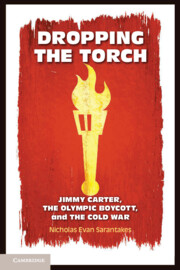Book contents
- Frontmatter
- Contents
- Acknowledgments
- Abbreviations
- Introduction Miracle on Ice
- Chapter 1 Lord Killanin and the Politics of the Olympics
- Chapter 2 Los Angeles versus Moscow
- Chapter 3 Jimmy Carter and U.S.-Soviet Relations
- Chapter 4 The Soviet Invasion of Afghanistan
- Chapter 5 The American Response
- Chapter 6 Easy Victories
- Chapter 7 Painful Losses
- Chapter 8 The White House Games
- Chapter 9 Coca-Cola, NBC, and the Defeat of the Iron Lady
- Chapter 10 The Vote in Colorado
- Chapter 11 Civil Wars
- Chapter 12 Carter versus Killanin
- Chapter 13 Moscow: The Olympics Are the Olympics
- Chapter 14 Los Angeles
- Chapter 15 Conclusion
- Epilogue
- Notes
- Bibliography
- Index
Chapter 9 - Coca-Cola, NBC, and the Defeat of the Iron Lady
Published online by Cambridge University Press: 05 September 2012
- Frontmatter
- Contents
- Acknowledgments
- Abbreviations
- Introduction Miracle on Ice
- Chapter 1 Lord Killanin and the Politics of the Olympics
- Chapter 2 Los Angeles versus Moscow
- Chapter 3 Jimmy Carter and U.S.-Soviet Relations
- Chapter 4 The Soviet Invasion of Afghanistan
- Chapter 5 The American Response
- Chapter 6 Easy Victories
- Chapter 7 Painful Losses
- Chapter 8 The White House Games
- Chapter 9 Coca-Cola, NBC, and the Defeat of the Iron Lady
- Chapter 10 The Vote in Colorado
- Chapter 11 Civil Wars
- Chapter 12 Carter versus Killanin
- Chapter 13 Moscow: The Olympics Are the Olympics
- Chapter 14 Los Angeles
- Chapter 15 Conclusion
- Epilogue
- Notes
- Bibliography
- Index
Summary
The boycott was in trouble. Lloyd Cutler knew this. He also knew it was his job to get results. Despite this realization, the boycott campaign continued to bleed out, taking one of its worst defeats before the month ended. The problem was that the administration continued to have trouble staying focused. The nature of the global economy caught Carter, Cutler, and the rest of the administration short. Economic and commercial issues absorbed an enormous amount of attention from the administration and also showed to what lengths Jimmy Carter was prepared to go to implement his policy.
There were a number of U.S. firms with ties to the Olympics. Some were major corporations, while others were medium-sized firms or privately owned businesses. Both types of business had different relationships with the Olympics, and many remained skeptical about the Carter administration’s prospects of success. In mid-January, The Wall Street Journal took a survey of fifty executive and found only four in support of the policy. Most preferred to take no position and see how things developed. Ambassador Dobrynin had no illusions about the power of these capitalists, even if such a view contradicted Communist theory. In his memoirs, he wrote, “Carter publicly called for a boycott of the summer Olympic Games in Moscow, an appeal that a number of companies who had committed themselves to supporting the athletes told us privately they could not challenge.”
- Type
- Chapter
- Information
- Dropping the TorchJimmy Carter, the Olympic Boycott, and the Cold War, pp. 166 - 179Publisher: Cambridge University PressPrint publication year: 2010



